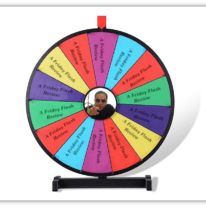Music is a passion of mine, much as it is for most of the tnocs.com crew. I imagine for some, the answer is easy when asked What’s your favorite song? or What’s your favorite artist?, but I’ve never been able to answer it. It really depends on which day of the week, you ask, my recent moods, and what’s been in my playlist lately (“Common People”, I’m looking at you!)

But a favorite book? For the last thirty years, there hasn’t been a second of hesitation:
Foucault’s Pendulum, by Umberto Eco. It’s the book Dan Brown’s The Da Vinci Code wants to be when it grows up.
In 1992, I spent the summer backpacking across Europe, an experience today’s young twenty-somethings will never appreciate: no internet, no contact with home, no computers or electronics. Besides my clothes and hygiene products, I carried with me three things:
1. The June 26, 1992 sports section of the USA Today
2. When Eight Bells Toll, by Alistair MacLean, my favorite book pre-1992, and
3. The 1992 edition of Let’s Go Europe!
For the first month of my trip, whenever I had a couple of hours on a train, or some quiet time in a hostel, I memorized every word, and by the time I hopped onto the train in Vienna, I probably could’ve described Belarus as if I’d spent a year exploring it myself.
On that train, I met some other backpackers who were heading to Venice as well, and one of them was carrying Foucault’s Pendulum. I asked him about the book, and he gave a brief synopsis. Once he put it down, I asked if I could read it.
I was hooked by the time we reached Venice. After an afternoon in the city, I headed back to the train to get to Rome to meet up with my cousin the next morning, with whom I’d split from in Berlin five days earlier. I arrived at the train station a few hours before he did, and searched the bookstores for it, only to find the Italian version. It wasn’t until I was waiting for the connecting flight home in Heathrow Airport that I purchased it.
Since then, I’ve owned seven copies of the book, and given five away to friends. If Foucault’s Pendulum were a holy book, I’d be Gideon, dropping it in every nightstand along my travels.
It’s a difficult book to sink one’s teeth into – in the first eighty pages or so, our first-person protagonist Casaubon is hiding in the Musée des Arts et Métiers afterhours, hoping to find a friend who’s been kidnapped. It reads like a stream of consciousness; and it’s difficult to follow Casaubon’s thoughts, but a couple things are made clear – secret societies run the world, and he’s gotten his friend in trouble.
The story then goes back in time, to when Casaubon was a university student in Milan where he meets Belbo and Diotavelli at a local watering hole, while the two men are ridiculing humanity:
“There are four kinds of people in this world: cretins, fools, morons, and lunatics…Cretins don’t even talk; they sort of slobber and stumble…Fools are in great demand, especially on social occasions. They embarrass everyone but provide material for conversation…Fools don’t claim that cats bark, but they talk about cats when everyone else is talking about dogs. They offend all the rules of conversation, and when they really offend, they’re magnificent…Morons never do the wrong thing. They get their reasoning wrong. Like the fellow who says that all dogs are pets and all dogs bark, and cats are pets, too, therefore cats bark…Morons will occasionally say something that’s right, but they say it for the wrong reason…A lunatic is easily recognized. He is a moron who doesn’t know the ropes. The moron proves his thesis; he has logic, however twisted it may be. The lunatic on the other hand, doesn’t concern himself at all with logic; he works by short circuits. For him, everything proves everything else. The lunatic is all idée fixe, and whatever he comes across confirms his lunacy. You can tell him by the liberties he takes with common sense, by his flashes of inspiration, and by the fact that sooner or later he brings up the Templars…There are lunatics who don’t bring up the Templars, but those who do are the most insidious. At first they seem normal, then all of a sudden…”
Ah, the Templars.
I should mention at this point that, besides music, I have a passion for history and conspiracy theories, and the best of both worlds start with the Knights Templar. Founded in 1119 in the heart of the Crusades, the Knights Templar have been reported to have some connection with Moses, the Freemasons, and every secret society in between. Forget the bogeyman; it’s a member of the banned Catholic military order that’s hiding in one’s closet.
Belbo and Diotavelli ask for Casaubon’s help reviewing a manuscript about the Templars for their publishing company, and while they reject the author, they take his ideas and began to play around with them, and in the process create an alternate world history they title “The Plan”…and the secret societies take notice.
I won’t take you any further on this journey across Italy, over to Brazil, back to Italy and finally to that claustrophobic hiding spot as Casaubon awaits midnight, but in this day and age where conspiracy theories seem to find their followers every day on social media, Foucault’s Pendulum seemed to anticipate the world of 2022 and gives it a wink.
Now, if I could only have convinced the Bond franchise the perfect sequel to Casino Royale was When Eight Bells Toll instead of Quantum of Solace…
⬇ Let the author know that you liked their article with a ‘heart’ upvote!





Sounds like a great read!
While Tom Robbins isn’t in the same league as Eco, I recommend his first novel, Another Roadside Attraction. It’s also hard to get through the first part but it turns into the story of how a former professional football player turned drug dealer hides from the Italian police in the Vatican and discovers the body of Christ. Which means there was no Resurrection. Which means Christianity is based on a lie. Now there’s a conspiracy theory for you. He smuggles the body to a hot dog stand and zoo in Washington state owned by some acquaintances and they try to decide whether to expose the lie.
That looks right up my alley!
About a year before Foucault’s Pendulum, I tried reading Skinny Legs and All, but couldn’t get into it. I’ll give Mr. Robbins another crack!
+1 for Another Roadside Attraction – amazing book
I’m the same in that naming a favourite song, album or artist is a tricky task. I have the same with films and books. There’s too much choice for all of them, its impossible to pin it down to just one. If ever I’m asked my mind tends to just go blank, bewildered by all the options.
A great story of how a chance meeting led you to the book. I ended up randomly reading a few books when I was travelling as they were swapped between people but none served any higher purpose than being something to pass time on long journeys.
I’ve heard of Foucault’s Pendulum without reading it, maybe time to add it to that ever lengthening to do list.
Bravo, thegue! Excellent first entry!
I have to say, I distinctly remember Umberto Eco being one of the authors we had to read in a college English class, but I don’t recall if it was this particular title or not. It was Eco, Kafka, and others in that vein. Only class I got a C in in college! The professor was so into how amazing and life changing these books were, and there were others in the class just as enthusiastic, and I spent the entire semester essentially with my eyebrow cocked. I just did not get it at all. I felt like I was in an art museum watching everyone else go bonkers over brush strokes and oil vs watercolor and I’m standing there completely lost, “I don’t get it. Its a bunch of types of yellow on a canvas.”
Your summary makes it sound way more interesting; you should’ve taught my class, lol.
Great write up!
I’ve been looking for something new to read, so perhaps I’ll check that out. I’m not interested in conspiracy theories per se, but I am interested in esotericism and occultist traditions, and Knights Templar lore is an important ingredient in that cultural stew.
I am usually okay with more difficult books: I loved Ulysses and Naked Lunch, for instance. Still, I’ve never been able to get through Gravity’s Rainbow, so who knows…
I really enjoyed The Name of the Rose, so I should check this one out.
Hard to pick a favorite, but it’s probably in the science fiction realm. Maybe Seveneves by Neal Stephenson or any of the Culture series from Iain M. Banks.
If you love science fiction, give Greg Bear a try. I’m not HUGE into sci-fi, but I’m impressed at how varied his worlds are. Start with Eon, or Darwin’s Radio, or The Forge of God, or….
I am with you on this one. I enjoyed The Name of the Rose, but I never sought out any more books by Eco. Maybe we should each give our own short reviews in the comments here as we finish it. I feel like many of us will seek it out based on this article.
I have to say…
Name of the Rose: 8/10
Foucault’s Pendulum: 10/10
The Island of the Day Before: 4/10
Baudilino: 3/10
The last two on this list read much like the first eighty pages I mentioned in FP. A lot of friends of mine were turned off by 80 pages of stream of consciousness, imagine 400+!
Name of the Rose was great.
Important safety tip. Start right out with the best. Thanks, thegue!
I like that idea.
It’s on my to-do list, after the 2 or 3 books I already have in line to finish. Maybe toward the end of spring / beginning of summer timeframe I’ll read FP. (I’m a slow / distracted reader.) Game on concept — in slow motion.
Love Neal Stephenson! Seveneves was quite impressive. I’ve read most of his earlier stuff, but neither of his most recent. Saving those for a special treat down the road. I’d list Snowcrash as a contender for my all-time fave (fiction category), but I’d have a very hard time settling on one book.
Thanks for the write-up, thegue! Haven’t read any Eco yet, maybe I’ll give FP a whirl…
Honestly the last three (Rise and Fall of DODO, Fall; or Dodge in Hell, and Termination Shock) were all good but not great like his previous high points. Fall is probably the best of the three — a sequel to Reamde, where the death of many of the main characters from the previous novel is the starting point of the story…
My top Neal Stephenson would be:
1. Seveneves
2. Anathem (close 2nd)
3. Cryptonomicon
4. Snow Crash
5. Reamde
I just finished Termination Shock last week. The buildup was strong, but the end felt kind of incomplete, like he was on deadline and rushed the ending. Not essential NS for this fan.
So happy to have a fellow Stephenson fan here to commiserate with BG. Kind of feel like TNOCS is our Hylaean Theoric World.
I feel exactly the same way! (That’s sort of a bluff, I’m drawing a total blank on Hylean Theoric World, but I’m right there with you on the broader feeling…) I think satisfactory endings is one category where NS misses more than he hits. I thought Seveneves’ ending was a bit too tidy, along with the ending for the Baroque Trilogy (which I loved otherwise).
I’d put Snowcrash on top again in terms of the ending, although I’d need to read Anathem again to really remember it. I’ve been meaning to do that anyway, though. The first third of the book, with the monastery (?) as the setting, hit me in a way that’s hard to describe. I guess I could say that I really wanted to live there and be one of those monks.
Seems like NS has a way of introducing curveball elements in the home stretch of stories, and using those to help wrap them up. It can come across as forced or too convenient if looked at closely (Reamde, Cryptonomicon), but I don’t mind overlooking that since the buildup is usually fun and thought-provoking. I’ve yet to be let down by NS on those counts.
It’s an Anathem reference.
https://anathem.fandom.com/wiki/Hylaean_Theoric_World
I wish I could read Anathem again for the first time. Completely hooked by the story and ideas, had no idea what would come next throughout.
I feel like Fall suffered from a couple of major faults – the first 1/4th of the novel was kind of unneccesary and should hav ejust been a separate novella, and I don’t feel like we ever got a good explanation as to why they couldn’t create multiple instances of the Afterlife, or instantiate individuals multiple times.
It just didn’t work the way that we understand computers and virtual worlds to work, with no explanation why.
I’ve actually not read Seveneves or Anathem yet. For some reason I keep bouncing off of them, but I will make another attempt soon.
Have you read the Stephen Bury novels? Interface is really good, and was worth revisiting a few years ago. I haven’t read The Cobweb since it came out, and it didn’t make enough of an impression on me to want to reread it.
Did you read Reamde before you read Fall? I don’t think it’s essential to understand it, but it sketches out many of the characters. I think they did explain why there could be only one instance in the afterlife (something to do with lasers destroying the brain in the reading process). But this part is definitely closer to hokum than science, so I grant you the skepticism. It’s not in my top 5 NS novels… My taste may not be your taste, but I found Seveneves and Anathem to be pure enjoyment on many levels.
I am not familiar with Stephen Bury. I’ll check out Interface… it’s in my queue.
I had read Reamde – it felt to me like Stephenson’s idea of a technothriller that could be optioned for a movie. (That’s not a complaint. I also think he missed the mark.)
I read Foucault’s Pendulum back in the ’90s, when it was mixed in with a diet heavy in Robert Anton Wilson (and all that you might assume went along with that.) I should definitely revisit it – I expect I will get very different things from it now.
I can’t say I have a favorite book. Terry Pratchett is definitely my favorite author, but I can’t elevate one particular book above the rest. (But the book I can’t elevate would probably be Night Watch.)